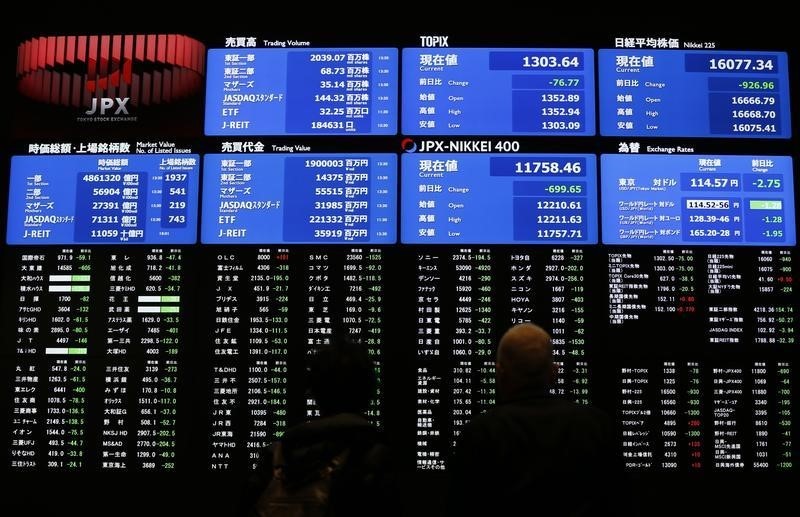By Saikat Chatterjee
HONG KONG (Reuters) - Asian share markets rose on Monday, extending last week's gains, as investors awaited a rush of February industry surveys to take the pulse of the global economy, while sterling stumbled on concerns the UK might yet vote to leave the European Union.
Despite the fresh "Brexit" uncertainty, financial spreadbetters expected European stock markets to open higher also, with Britain's FTSE (FTSE) seen up 0.50 percent, Germany's DAX (GDAXI) 0.37 percent, and France's CAC 40 (FCHI) 0.54 percent.
E-Mini futures for the S&P 500 (ESc1) were up 0.6 percent.
But much of the day's action was in the currency markets, where sterling tumbled on worries that Britain may quit the European Union flared up after London Mayor Boris Johnson threw his weight behind the exit campaign.
It slid as far as $1.4235
Against the yen, it slumped to as low as 160.40 yen (GBPJPY=R), its lowest since November 2013, from 162.10 late on Friday before partially rebounding.
"Political uncertainty generated by the UK referendum will weigh on GBP," said Elias Haddad, currency strategist at Commonwealth Bank.
As dealers expect choppy trading in coming months towards the referendum, implied volatilities on sterling options rose to near highest levels in more than four years.
Other major currencies were steadier. The dollar was a touch firmer at 112.90 yen
The dollar was underpinned by data last Friday that showed underlying U.S. consumer price inflation accelerated in January by the most in nearly 4-1/2 years, supporting the view the Fed could gradually raise interest rates this year as forecast.
ASIA STOCKS UP, EYE G20, EARNINGS
Stock markets across Asia rose, with MSCI's broadest index of Asia-Pacific shares outside Japan up 0.8 percent, having rebounded more than 4 percent last week.
China's benchmark indexes rose 2 percent as investors welcomed Beijing's decision to replace the top securities regulator and on signs the government was stepping up its economic stimulus efforts.
The calmer mood was aided by oil as Brent crude added 1.6 percent to $33.54 and U.S. crude rose slightly to $30.24.
Japan's Nikkei (N225) recouped early losses to rise 1 percent, buoyed by a retreat in the yen even as an activity survey showed a drop in new export orders hurt manufacturing.
The Markit/Nikkei Flash Japan PMI fell to 50.2 in February, from 52.3 in January, a potentially bleak omen for the rest of the region, but investors focused on the market's recent rebound instead.
"Equity markets successfully stress-tested and bounced from key technical support last week," wrote analysts at RBC Capital Markets.
"While we cannot definitively say the cycle/2016 lows are in place yet, the technical evidence continues to suggest a more durable bottom may be forming."
A busy week for data will culminate with a Group of 20 finance ministers and central bankers meeting in Shanghai that will offer leaders a chance to soothe market concerns with talk of coordination.
There has been some chatter about a possible grand currency agreement that would allow for a depreciation in the U.S. dollar, which might relieve pressure on commodity prices and on emerging markets.
However, most analysts consider it very unlikely given so many of the G20 central banks are actively easing policy and need their own currencies to stay competitive.
Asian investors also will be keeping an eye on corporate earnings which kicked off this week.

Europe's biggest bank HSBC (L:HSBA) (HK:0005) said it saw a 'bumpier' financial environment ahead after delivering flat 2015 profit growth. Insurer AIA (HK:1299) and sports giant Anta Sports (HK:2020) declare results later this week.